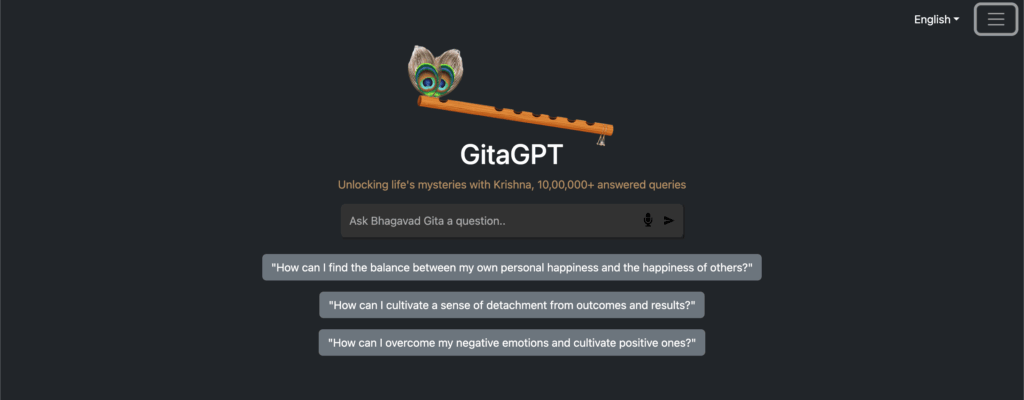Daniyal Mahmood Ahmad, Al Hakam

Imagine having the ability to directly communicate with the divine, not through subtle signs and mediums, but through direct dialogue. Historically, this has been an honour reserved for the most sacred and holiest of people: the Prophets of God and His saints. But what if there was a new method which democratised and disrupted this bond of sacred communication?
This is what various AI chatbots, such as Gita GPT, purport to do. The model is simple; users can ask “god” questions, and AI replies using sacred and religious texts as well as pre-trained data – though this remains an important caveat.
This seems pleasant and harmless at first, as all it does is make spiritual wisdom accessible to the masses. But the question must be asked: what happens when humans attempt to digitalise divinity?
The technology

Trained on the Bhagavad Gita, these large language models are presented as chatbots to simulate conversations between humans and “gods”. People can ask questions or converse with it and receive tailor-made responses based on the hundreds of verses of the Bhagavad Gita. Some of these chatbots are so advanced that they supposedly answer in the voice of “Lord Krishna” himself.
This might seem eerily similar to the story of the Holy Quran in which the Bani Isra’il made a mechanical golden calf for worship that produced a similar sound to a real cow (Surah Ta Ha, Ch.20: V.88). Whereas it appeared to have life, it was ultimately a soulless creation, a deception of human craftsmanship mistaken for divinity.
It’s worth noting that these AI models don’t possess consciousness of their own. They pattern-match words without any real belief or divine understanding. So when users emotionally project real divinity onto them, that is where the deeper issues arise.
Technology might be able to simulate speech, but it cannot provide absolute truth or divine revelation.
Claiming the unseen
“He is Allah, and there is no God beside Him, the Knower of the unseen and the seen. He is the Gracious, the Merciful.” (Surah al-Hashr, Ch.59: V.23)
In Islamic theology, one of the many divine attributes of Allah the Almighty is that of exclusive divine knowledge. It is beyond human comprehension and, therefore, must be beyond the comprehension of anything man-made.
This exclusion even applies to the honoured Prophets of God. Even the greatest of them, the Holy Prophet Muhammadsa, was asked about the soul and responded that it is an affair of God, and humans have been given a limited understanding of the concept of it. (Surah Bani Isra’il, Ch.17: V.86)
A prophet of God, who is a recipient of divine knowledge, can admit to the limitation of human knowledge, which is a humility that AI-driven theology lacks.
Revelation or replication
Receiving revelation or divine dialogue is explicitly a process dictated solely by Allah’s will, as the Holy Quran testifies:
“And it is not for a man that Allah should speak to him except by revelation or from behind a veil or by sending a messenger to reveal by His command what He pleases. Surely, He is High, Wise.” (Surah ash-Shura, Ch.42: V.52)
Hence, it is a divinely initiated process, in the form and medium that Allah chooses. Attempting to “speak to god” through technology risks trivialising faith, essentially turning spirituality into nothing more than a simulation.
This would render such discourse into mere replication. That is exactly what Musaylimah al-Khadhab, the false prophet of Yamamah, did by claiming prophethood and presenting his own rhymed sayings and poetry as “revelation”. His words might have mimicked the Holy Quran, but they certainly lacked depth, coherence and divine insight – it was mere replication.
The only difference now is that instead of Musaylimah, the inherent bias of such chatbots would be that of their creators, whoever they may be – and all based on pre-trained data.
Reflection, not simulation
While Gita GPT might provide some short-term and surface-level “answers”, it poses some real risks and points of contention. By blurring the boundary between the Creator and His creation, would AI provide any real benefit or merely diminish revelation by mimicking scripture? Such efforts might appear to be building tools to replace God rather than to understand Him, which seems counterintuitive.
It would be worth pondering whether unchecked experimentation is worthwhile, or if humans should realise and accept the fact that there are certain limitations to their capabilities and refrain from what might be perceived as trespassing in the domain of God and the prophets?
The Quran does, after all, invite tafakkur (reflection), not simulation. “And these are similitudes that We set forth for mankind that they may reflect.” (Surah al-Hashr, Ch.59: V.22)

